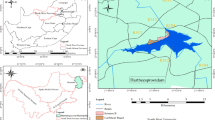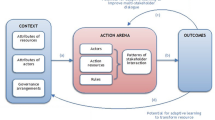Abstract
The influence of the EU over environmental policy frameworks, plus the availability of project funding for ENGOs in acceding and candidate states across post-socialist Europe has significantly shaped action repertoires, issue agendas and patterns of mobilisation. It has also been claimed that EU intervention has determined the institutionalisation of ‘green’ civil society networks by the introduction of, for example, environmental impact assessment (EIA) processes and policy-making norms that emphasise intersectoral partnership and multilevel governance. However, research on the impact of EU assistance for environmental mobilisations in Bosnia–Herzegovina and Serbia reveals the extent to which EU intervention and influence builds professionalism, but only partially institutionalises recipient ENGOs; if they are accorded political access at all, it is ephemeral and within less contentious policy areas where they are encouraged to deliver expertise and assistance rather than to act as advocates for community interests or to express political opposition to contentious developments. This article concludes that the professionalisation and increased managerial capacity of a handful of ENGOs cannot be equated with good governance and with the institutionalisation of non-governmental actors. Indeed, increased professionalism is invariably confined to a very narrow spectrum of policy enactment and is insufficient to generate environmental governance in the absence of state or governmental capacity.
Similar content being viewed by others
Notes
It is appropriate here to use both acronyms insofar as the most prominent environmental organisations in post-socialist states tend to be disconnected from the environmental movement as such, having emerged in response to foreign donor initiatives and the availability of ‘green’ resources. Other organisations have their roots in the socialist period or in the revolutions of the late 1980s and can therefore claim to be movement organisations.
Certain organisations working on environmental issues (for example, the Serbian organisation Pomuc Deci) were established in the early 1990s as civic organisations. The research did not discover a single organisation that had been constituted as an environmental organisation before the arrival of international donors and the EU in particular. Although certain organisations (for example, the Bosnian organisation CESD) can claim to have existed before the collapse of Yugoslavia, they did so as part of governmental agencies or state institutions and have reconstituted themselves as NGOs in response to the availability of donor funding.
The research has been funded by the British Academy (SG-45257) and the Nuffield Foundation (SGS/33624).
For example, the Bosnian NGO Pomuc Deci has been successful recently in obtaining an EU micro grant for a project involving Roma citizens and community recycling provision.
The Zagreb Summit of November 2000 formally established a new relationship with the Federal Republic of Yugoslavia. The Summit marked the start of the SAp, and in its declaration stated that ‘the prospect of a stabilisation and association agreement is now established in accordance with the invitation issued by the council on 9 October 2000. A decision has been taken to set up an “EU/FRY consultative task force”. The Commission will work on a feasibility study with a view to negotiating directives for a stabilization and association agreement’, (www.delscg.cec.eu.int/en/documents/24-11-2000-zagreb-declaratione.htm), accessed 26 July 2007.
EC No. 1085/2006.
EU Commission (2007) ‘IPA Programming Guide’ (p. 7).
IPA brings together and unites under one framework the various different aid programmes that previously existed (Phare, ISPA, SAPARD, Turkey Instrument and CARDS), and thus deals with both candidate and potential candidate countries as part of the same programme.
See in particular, Rosenau and Czempiel, 1992; James Rosenau, 1995; Barnett and Duvall, 2005.
The imbalance between the number of organisations surveyed in BiH and Serbia is due to the fact that the EAR announced fewer calls for environment-related projects and awarded a smaller number of projects to ENGOs compared to the delegation in BiH.
The EAR is the main agency for allocating EU funds in Serbia.
Usually around 20 organisations are awarded grants in each round.
Projects can fall under more than one rubric. Most projects were funded under combined initiatives to strengthen democracy and civil society development.
Interview with Rijad Tikvesa (Director), Ekotim, 7 February 2007 (Sarajevo).
The core argument of transaction cost theory is that cooperation between state and non-state actors occurs to reduce the costs imposed by lengthy deliberation, providing an incentive for both sides to cooperate. Principal agent theory argues that where governments lack time and expertise to deal with increasingly complex problems this acts as an incentive to engage non-state actors who can provide knowledge and expertise.
References
Barnett, M. and Duvall, R. (2005) Power in global governance. In: M. Barnett and R. Duvall (eds.) Power in Global Governance. Cambridge: Cambridge University Press.
Bokovoy, M.K., Irvine, J.A. and Lilly, C.S. (eds.) (1997) State–Society Relations in Yugoslavia 1945–1992. London: MacMillan.
Börzel, TA . (2010) New modes of governance and accession. The paradox of double weakness. In: T.A. Börzel (ed.). Coping with Accession to the European Union. New Modes of Environmental Governance. Basingstoke: Palgrave, pp. 7–31.
Carmin, J. and Jehlicka, P. (2005) By the masses or for the masses? The transformation of voluntary action in the Czech union for nature protection. Voluntas 16 (4): 397–414.
Carmin, J. and Vandeveer, S.D. (2004) Enlarging EU environments: Central and Eastern Europe from transition to accession. Environmental Politics 13 (1): 3–24.
Cellarius, B.A. and Staddon, C. (2002) Environmental nongovernmental organizations, civil society and democratization in Bulgaria. East European Politics and Societies 16 (1): 182–222.
Dalton, R.J. (1994) The Green Rainbow: Environmental Groups in Western Europe. London: Yale University Press.
Della Porta, D. and Rucht, D. (2002) The dynamics of environmental campaigns. Mobilization 7 (1): 1–14.
Diani, M. and Donati, P. (1999) Organizational change in western European environmental groups: A framework for analysis. Environmental Politics 8 (1): 13–34.
Doherty, B. (2002) Ideas and Actions in the Green Movement. London: Routledge.
Doyle, T. and McEachern, D. (2001) Environment and Politics, 2nd edn. London: Routledge.
Evans, P.B. (1995) Embedded Autonomy: States and Industrial Transformation. Princeton, NJ: Princeton University Press.
Fagan, A. (2004) Environment and Democracy in the Czech Republic: The Environmental Movement in the Transition Process. Cheltenham: Edward Elgar.
Fagan, A. (2006a) Transnational aid for civil society development in post-socialist Europe: Democratic consolidation or a new imperialism? Journal of Communist Studies and Transition Politics 22 (1): 115–134.
Fagan, A. (2006b) Neither north nor south: The environment and civil society in post-conflict Bosnia–Herzegovina. Environmental Politics 15 (5): 782–802.
Fagan, A. and Jehlicka, P. (2003) Contours of the Czech environmental movement: A comparative analysis of Hnuti Duha and Jihoceske matky. Environmental Politics 12 (2): 49–70.
Hellman, J.S., Jones, G. and Kaufmann, D. (2000) Seize the State, Seize the Day: State Capture, Corruption and Influence in Transition. Washington DC: World Bank.
Héritier, A. (2003) New modes of governance in Europe: Increasing political capacity and policy effectiveness? In: T.A. Börzel and R. Cichowski (eds.) 2003: The State of the European Union, 6 – Law, Politics, and Society. Oxford: Oxford University Press.
Howard, M.M. (2003) The Weakness of Civil Society in Post-Communist Europe. Cambridge: Cambridge University Press.
Jamison, A. (2002) The Making of Green Knowledge – Environmental Politics and Cultural Transformation. Cambridge: Cambridge University Press.
Kenis, P. and Schneider, V. (1991) Policy networks and policy analysis: Scrutinizing a new analytical toolbox. Policy networks: Empirical evidence and theoretical considerations. In: B. Marin and R. Mayntz (eds.) Policy Network: Empirical Evidence and Theoretical Considerations. Boulder, CO: Westview Press.
Kohler-Koch, B. (1996) The strength of weakness. The transformation of governance in the EU. In: S. Gustavsson and L. Lewin (eds.) The Future of the Nation State. Essays on Cultural Pluralism and Political Integration. Stockholm: Nerenius & Santerus, pp. 169–210.
Kriesi, H. (1995) The political opportunity structure of new social movements: Its impact on their mobilization. In: J.J. Craig and K. Bert (eds.) The Politics of Social Protest. London: UCL Press.
Mandel, R. (2002) Seeding civil society. In: C.M. Hann (ed.) Postsocialisms: Ideals, Ideologies and Practices in Eurasia. London: Routledge.
Meyer, D.S. and Tarrow, S. (1998) The Social Movement Society: Contentious Politics for a New Century. Lanham and Oxford: Rowman and Littlefield.
Migdal, J.S. (1988) Strong Societies and Weak Sates. State-Society Relations and State Capabilities in the Third World. Princenton, NJ: Princeton University Press.
Ottaway, M. (2000) Social movements, professionalization of reform, and democracy in Africa. In: M. Ottaway and T. Carothers (eds.) Funding Virtue: Civil Society Aid and Democracy Promotion. Washington DC: Carnegie Endowment for International Peace.
Pickvance, K. (1998) Democracy and Environmental Movements in Eastern Europe. Boulder, CO: Westview.
Quigley, K.E.F. (2000) Lofty goals, modest results: Assisting civil society in Eastern Europe. In: M. Ottaway and T. Carothers (eds.) Funding Virtue: Civil Society Aid and Democracy Promotion. Washington DC: Carnegie Endowment for International Peace, pp. 191–216.
Rhodes, R.A.W. (1997) Understanding Governance. Policy Networks, Governance, Reflexivity and Accountability. Buckingham and Philadelphia: Open University Press.
Rootes, C. (ed.) (2003) Environmental Protest in Western Europe. Oxford: Oxford University Press.
Rosenau, J. (1995) Governance in the twenty-first century. Global Governance 1 (1): 13–43.
Rosenau, J. and Czempiel, E. (eds.) (1992) Governance without Government: Order and Change in World Politics. Cambridge: Cambridge University Press.
Rucht, D. and Roose, J. (1990) The German environmental movement at a crossroads? Environmental Politics 8 (1): 59–90.
Sampson, S. (1996) The social life of projects: Importing civil society to Albania. In: C. Hann and E. Dunn (eds.) Civil Society: Challenging Western Models. London: Routledge, pp. 120–138.
Scarce, R. (1990) Eco-warriors: Understanding the Radical Ecology Movement. Chicago, IL: Noble Press.
Scharpf, F.W. (1978) Interorganizational policy studies: Issues, concepts and perspectives: Interorganizational policy making. In: K. Hanf and F.W. Scharpf (eds.) Limits to Coordination and Central Control. London: SAGE, pp. 57–112.
Sissenich, B. (2007) Building States Without Societies. European Union Enlargement and the Transfer of EU Social Policy to Poland and Hungary. Lanham, MD: Lexington Books.
Van der Heijden, H.-A. (1997) Political opportunity structures and the institutionalisation of the environmental movement. Environmental Politics 6 (4): 25–50.
Weiss, L. (1998) The Myth of the Powerless State. Oxford: Polity Press.
Yanacopulos, H. (2005) Patterns of governance: The rise of transnational coalitions of NGOs. Global Society 19 (3): 247–266.
Author information
Authors and Affiliations
Corresponding author
Rights and permissions
About this article
Cite this article
Fagan, A. The new kids on the block – Building environmental governance in the Western Balkans. Acta Polit 45, 203–228 (2010). https://doi.org/10.1057/ap.2009.19
Published:
Issue Date:
DOI: https://doi.org/10.1057/ap.2009.19




